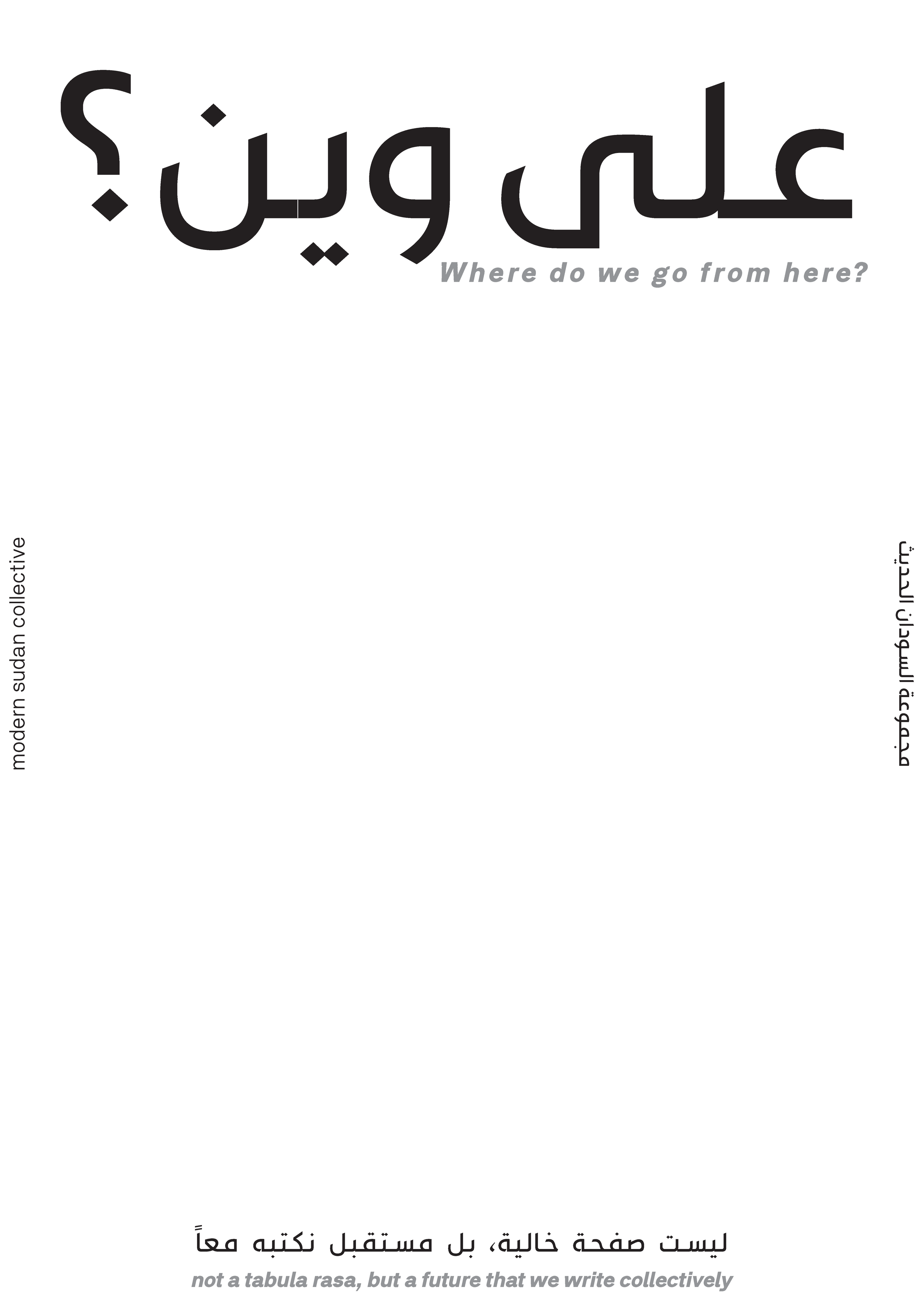First Session
على وين؟
الجلسة الأولى
٢٧ سبتمبر ٢٠٢٥
٤:٠٠م بتوقيت الخرطوم
قاموس
Where do we go from here?
First session
Sep 27, 2025
04:00 PM Khartoum
Lexicon
Event Description
This initiative examines the condition of conflict as a space for critical thinking beyond mere reconstruction. Its aim is to confront the enduring legacies, hierarchies, narratives, and laws that continue to shape life long after conflicts have ended. Through a series of discussions held every three weeks, we collectively shape the conversation.
Suggestions for participation are encouraged from a diverse range of perspectives, including architects, researchers, practitioners, students, historians, anthropologists, and artists. Topics may encompass, but are not limited to, language, history, heritage, neoliberal policies, pedagogy, and the formation of urban and social spaces.
وصف الحدث
تتطرق هذه المبادرة إلى حالة الصراع كمساحة للتفكير النقدي، متجاوزة محدودية مفاهيم إعادة الإعمار. وتهدف إلى مواجهة الإرث والطبقات والسرديات والقوانين الراسخة التي ستستمر في التأثير على حياة المجتمعات بعد انتهاء الصراعات. من خلال سلسلة من المناقشات تُعقد كل ثلاثة أسابيع، نعمل معًا على تشكيل هذا النقاش معاً.
نرحب بالمشاركة والمقترحات من جميع التخصصات، بما في ذلك المعماريون، الباحثون
الممارسون، الطلبة، المؤرخون، الأنثروبولوجيون، والفنانون. قد تتناول المواضيع، على سبيل المثال لا الحصر، اللغة، التاريخ، التراث، السياسات النيوليبرالية، منهجيات التدريس، وتشكيل الفضاءات الحضرية والاجتماعية
1 Lexicon
This session resists predefined definitions, and instead, asks how language itself becomes a site of struggle. To speak of the post-war is to accept that war has concluded. But what if war persists, embedded in laws, memories, bodies, and ruins or continues in not-so-distant geographies? To call it reconstruction is to envision repair; yet, what if reconstruction often re-inscribes the very violence it seeks to transcend? This session resists predefined definitions, instead asking how language itself becomes a site of struggle. Together, we want to explore terminologies, refusing to let them obscure histories still in the process of unfolding or to limit the future to repetitive histories of violence. We are still learning how to articulate this condition—what we call it, how we speak of it—and the words we choose carry significant weight. They can hold individuals accountable or, conversely, serve to silence or dismiss. Alongside invited speakers and those in attendance we will collectively unpack the language of war. In some places, the past has been deliberately forgotten or even censored to enable progress. In others, accountability and remembrance continue. The language we choose to employ will influence our decisions and how we navigate these conversations. For now, this space is a blank canvas until further notice.
١ قاموس
تبدأ هذه الجلسة بتركيب اللغة كمدخل أساسي للنقاشات المقبلة، فهي لا تفترض نهاية الحرب، بل تطرح تساؤلات حول ما نعنيه عندما نردد "مرحلة ما بعد الحرب": هل يعني ذلك التسليم بانتهاء الحرب؟ الحرب التي قد تكون لا تزال مستمرة، ومتجذرة في القوانين والذكريات والأجساد والأطلال، أو في مناطق جغرافية غير بعيدة. ماذا عن مفردات مثل "إعادة الإعمار"، التي تبدو تصورات للإصلاح، لكنها أحيانًا تُعيد إنتاج العنف الذي نتوق لتجاوزه؟ تتجنب الجلسة التعريفات المُحددة مسبقًا، لتفتح المجال للتفكير في كيفية تحول اللغة نفسها إلى ساحة صراع
معًا، سنكتشف المصطلحات، رافضين السماح لها بحجب تواريخ لا تزال في طور الكشف، أو حصر المستقبل في تواريخ عنف متكررة. ما زلنا نتعلم كيفية التعبير عن هذه الحالة — ما نسميها، وكيف نتحدث عنها — فالكلمات التي نختارها تحمل ثقلاً. يمكن أن تؤدي إلى المحاسبة، أو أن تُسهم في إسكات الحق وتهميشه. بمشاركة المتحدثين المدعوين ومع الحضور الكريم، سنُحلل معًا لغة الحرب، في أماكن يُنسى فيها الماضي عمدًا أو يُحظر لإفساح المجال للتقدم. في حالات أخرى، تستمر المساءلة والتذكر. اللغة التي نختارها تؤثر على كيفية تطرقنا لهذا الحديث. في الوقت الحالي، تظل هذه المساحة مفتوحة، وخالية حتى إشعار آخر
انقضت الجلسة الأولى، و لكن ما زال بامكانكم مشاركتنا في الجلسات القادمة عبر التسجيل في الاستمارة ادناه
The initial session has concluded. Please proceed to register your interest in upcoming events by completing the form below.
